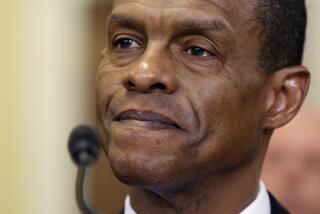Why Gates Won’t Let Go: The Pain of Losing Power : Authority: It’s never easy to give up power, because it means giving up part of one’s identity. For many, it’s a kind of death.
- Share via
If it were not such a tragedy, there would almost be something comic about the way Daryl Gates is letting go of power. He has driven the political Establishment to distraction, made the LAPD and the city a laughingstock, probably raised the sales of his book and forced himself out on a limb from which he may never recover the glory of his long career.
What is going on, among other things, is the painful process of losing power, linked to the excitement of one final definitive battle. We have seen it before: Richard Nixon, Evan Mecham, Ed Meese, James Watt, Jim Wright. People who were so caught up in the eye of the storm that they appeared incapable of measuring the destruction--at least when seen from the outside.
Inside, there is a bunker mentality. If you hold real power for any length of time, it wraps itself around your character and it is hard to separate the individual from the office. An attack on the person is an attack on the office is an attack on the institution. Gates becomes not the source of the problem but the symbol. And as a symbol, he cannot give up or he would be letting down the entire organization.
There is some truth to that. It is also characteristic of the people who lose power this way that the particular incident that led to the crisis was not of their own doing, or if it was, it was a minor act, not a measure of what they contributed in the long run. Nixon did not break into the Watergate building. Gates did not beat up Rodney King. Wright’s book deals were irrelevant to his being Speaker of the House. The first reaction, then, is to quell a disturbance and smooth the waters, not face the issue full front.
The first reaction tightens the guard inside the bunker and lessens the chance that an alternative view will get through. It is human nature to believe you can ride out the storm, and everyone who is close to the boss on a day-to-day basis has a vested interest in the storm passing. He, and they, need to believe in his leadership and invincibility.
From Gates’ perspective, there is one other compelling reason to fight to the finish: If he goes, the furor will settle down and he will never again have the opportunity to redeem his reputation. Last week, TV network promotions for his appearances were already referring to him as the “former chief.” But now the media hangs on his every word. Now he is the center of attention. Every day is a great test of character. If he succeeds, he will be a hero. If he loses, he will be forgotten and lose the chance to redeem his reputation.
It is never easy to give up power, because it means giving up part of one’s identity. People who have lost power talk about the loss of a sense of significance. For many, it is a kind of death and a recognition, or a fear, that all the best is past.
Surviving the loss of power requires the individual to reinvent himself and learn to find happiness in other achievements. It takes time--usually about a year and a half, I found in doing research on the subject. It takes attention. It means getting over a period of awkward incompetence and relearning the skills of private life (dialing the phone, making your own reservations, remembering how to spell). There is a story in Washington about a former Cabinet secretary who wanted to go somewhere the day after he left office; he went out to his car and got in the back seat.
(Barbara Bush once said that if her husband lost the 1988 election, she, for one, was not going to drive away from the White House with him because he had not driven his own car in decades. Linwood Holton, the former governor of Virginia, did drive his family home when they left the Statehouse, but he got lost twice.)
It would be better for all of us if Daryl Gates began to think about what he will do next and what else he might achieve in life. He has assured us, one more time, that he will leave office before forcing the city into yet another constitutional crisis. It is time for us, too, to think about the future.
More to Read
Sign up for our Book Club newsletter
Get the latest news, events and more from the Los Angeles Times Book Club, and help us get L.A. reading and talking.
You may occasionally receive promotional content from the Los Angeles Times.








